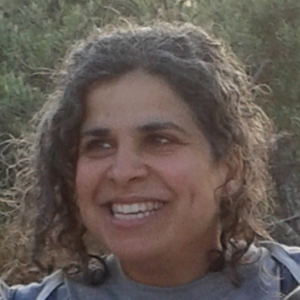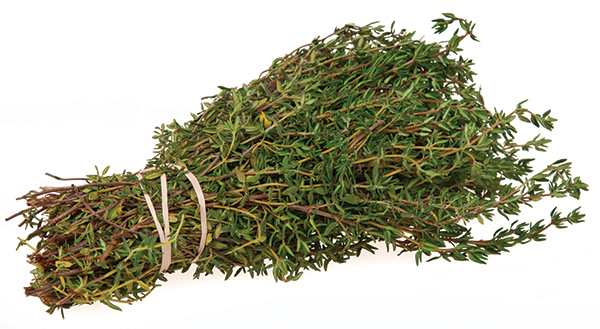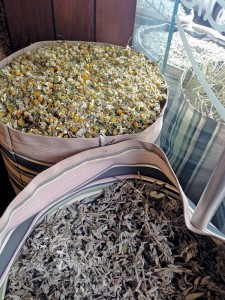 My grandfather would make his annual pilgrimage from Al-Bireh to Al-Ouja before every winter in order to transfer his herd of goats and sheep to a warmer climate. This journey would take months, according to my mother. I never met my grandfather. But I always wondered why he did not just stay in Al-Ouja for the winter and return to Al-Bireh in the spring with his herd. In those days, people traveled across the country by foot or via donkey. My mother pointed out that my grandfather always returned with a fever. My grandmother would boil ja’ada (felty germander or Teucrium polium), a wild herb that grows in Palestine, to help cure his ailment. Today, many of us go to the local emergency room or to our family physician and ask for a prescription to relieve our annoying symptoms. This traditional knowledge of natural and herbal healing is fading, while the modern medical and pharmaceutical industries are taking off. I wish we could make room for both.
My grandfather would make his annual pilgrimage from Al-Bireh to Al-Ouja before every winter in order to transfer his herd of goats and sheep to a warmer climate. This journey would take months, according to my mother. I never met my grandfather. But I always wondered why he did not just stay in Al-Ouja for the winter and return to Al-Bireh in the spring with his herd. In those days, people traveled across the country by foot or via donkey. My mother pointed out that my grandfather always returned with a fever. My grandmother would boil ja’ada (felty germander or Teucrium polium), a wild herb that grows in Palestine, to help cure his ailment. Today, many of us go to the local emergency room or to our family physician and ask for a prescription to relieve our annoying symptoms. This traditional knowledge of natural and herbal healing is fading, while the modern medical and pharmaceutical industries are taking off. I wish we could make room for both.
Historically, the Arab and Islamic civilizations pioneered the field of medicine. According to Bashar Saad and Omar Said’s Greco-Arab and Islamic Herbal Medicine, during the Abbasid dynasty, Baghdad and Cordoba became the main centers for the development of herbal medicine. Al-Zahrawi of Cordoba wrote The Book of Simples, which is a good source of herbal medicine. And according to the recommendations of Ibn Sina (Avicenna), patients were treated through a scheme of diet and physiotherapy. Drugs were only used when diet and physiotherapy failed.
♦ Traditionally, Palestinians used local herbs and foods to heal their ailments. Herbalists or atareen were sought out for advice and remedies. Today, most people visit their family physician or the emergency room in search of a prescription to relieve their annoying symptoms. Are we losing our traditional knowledge in exchange for modern medicine’s quick fixes?!
I recently posted a message on Facebook asking to be connected to traditional healers in Palestine. I got three responses. One included a priest in Ain Areek who serves as a traditional healer during his non-church-duty time. There was an article written about this herbal healing priest already. So rather than roam around these three villages looking for the traditional healer, I decided to visit the Souq al-Atareen (the herbalist market) in the old city of Jerusalem. Surely I would find several herbalists in this market. I entered through Damascus Gate and was told by local shopkeepers to continue straight towards Souq al-Atareen. I walked past jewelry shops, souvenir stands, women’s clothing, children’s books, daily household needs, and old fallahat (peasant women) sitting at the edge of the road selling their seasonal produce. I walked for nearly 15 minutes until I finally saw the entry sign that led to Souq al-Atareen. I entered, or actually, I continued, as this was just a continuation of the road that I was walking. I saw more of the same, trinket shops and everyday needs shops, and two or three spice shops. Where are the atareen (herbalists) in the Souq al-Atareen? I stopped at one of the spice shops to speak to the atar (herbalist). “I was told that this is Souq al-Atareen,” I said. “But besides you, where are the atareen?” I asked. The older man explained that this souq (market) used to be busy with atareen, but today there are only a few. He shared that he learned the business from his father, and his son is learning the business from him. However, I did not see his son in the shop. He must have another day job. The atar clarified that he neither prescribes nor prepares mixes of herbs. He only sells simple herbs. There are too many diseases these days, he told me. I was disappointed. I could not find a real atar in the Souq al-Atareen of old Jerusalem.
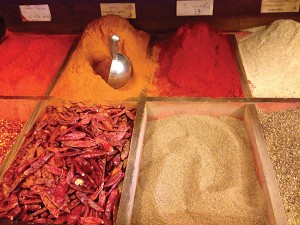 I still sought an atar who had the old knowledge that my grandparents possessed. I never met any of my grandparents. They passed away before my first visit to Palestine. But I craved the indigenous knowledge that I could have acquired had I had the opportunity to know them.
I still sought an atar who had the old knowledge that my grandparents possessed. I never met any of my grandparents. They passed away before my first visit to Palestine. But I craved the indigenous knowledge that I could have acquired had I had the opportunity to know them.
I decided to visit Saleh Khalaf in old Ramallah, otherwise known as Ramallah Al-Tahta. The Saleh Khalaf herb and spice shop has been in business for 75 years. The elder Khalaf, Husam, learned the trade from his father, Saleh. Husam, also known as Abu Iyad, disclosed that he was his father’s companion. He learned everything about the use of herbs and spices from his father and from years of experience. Husam joked that an atar was equal to half a physician. He shared some of his remedies with me. The local herb, rijl hamam, pigeon’s foot, is a good remedy for kidney stones. Za’rour or hawthorn leaves with cinnamon for diabetes. And onion and honey for lung infections. Cinnamon oil is great for influenza. And on and on he went. I had finally found a real atar! Abu Iyad is a walking encyclopedia of herbal medicine; I want to hang out with him every day.
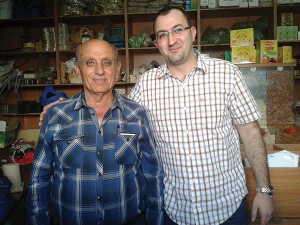
While I stood at the shop entrance trying to absorb all this knowledge, an older man holding a long sock walked in and asked Abu Iyad to fill it with flax seeds. He then proceeded to wrap it around his neck. They explained that the sock filled with flax seeds should be microwaved and then wrapped around the neck. This remedy relieves those who suffer from back disc issues.
Some years ago, Abu Iyad had planned to retire and close the business. His sons had emigrated to the United States after high school to attend university and work. He said that there was no reason to maintain the business when his children were abroad. However, his sons returned to Palestine five years ago and proceeded to establish a new branch of the Saleh Khalaf store. Iyad, Husam’s eldest son, noted that he had returned to Palestine with the plan to open a new and more expanded shop. While the third generation of Khalaf atareen are maintaining their grandfather’s herbal recipes, they have also added new mixtures based on new knowledge. Unlike the old-school atareen, the new generations do not attempt to diagnose and cure diseases. Rather, they help customers understand the uses and benefits of various herbs and foods. The goal is to provide their customers with the best available products for all their needs.
A visit to the new store will provide the customer with a wide array of traditional Palestinian herbs, spices, and foods, as well as with modern health products such as coconut oil, chia seeds, coarse sea salt, and brewer’s yeast, just to name a few.
Abu Iyad is all smiles as he addresses the various needs of his customers. It is clear that he enjoys his work and is happy that his sons have returned to their hometown of Ramallah to continue the family tradition. “Thank God the boys have returned,” he said.
“We are not operating a monopoly,” Abu Iyad continued. “We are just here to help people.” He shared a story about a recent customer who had come to him with a sore throat. The customer had already spent NIS 950 on two physicians as he sought a remedy for his sore throat. When this failed, the customer approached Abu Iyad for advice. Abu Iyad’s first response was that the doctors should have been able to provide a brand new throat for NIS 950 NIS! In any case, Abu Iyad provided the necessary remedy for a mere NIS 20.
“We atareen live long lives,” explained Abu Iyad. “God wants us to live for a very long time so that we can help people.” I agree. Thank God that we still have atareen like Ramallah’s Saleh Khalaf and sons in Palestine.
Recently, I read an article about an herbalist in the United States. He explained that the wild herbs and vegetation that grow in a particular location are a response to a specific disease or ailment present in that area. Our wild herbs and vegetation are a reaction to our needs. Our survival depends on these natural plants.
Our traditional knowledge must be maintained. It’s our culture, our heritage, and our way of life. Our existence depends on it.
» Aisha Mansour spends her free time growing food and caring for her chickens and baladi dog, Sam. She blogs at: www.seasonalpalestinian.wordpress.com. She is also co-founder of the Sharaka volunteer initiative that aims to support small-scale Palestinian farmers.

